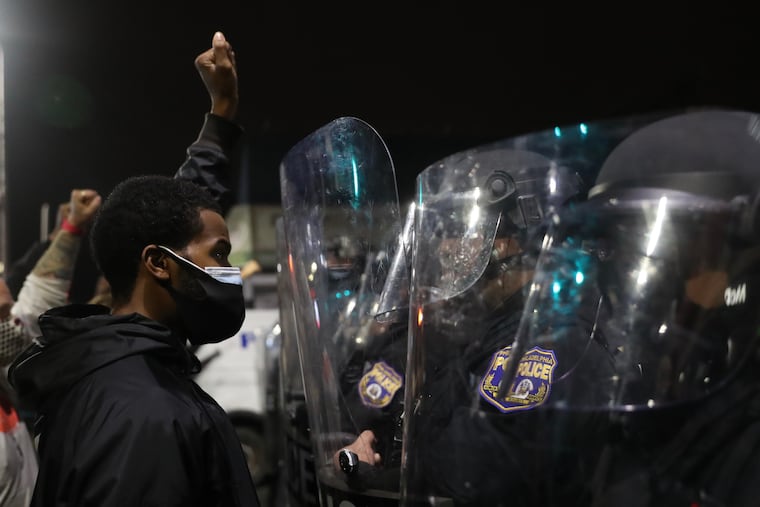White people can’t give in to Black Lives Matter fatigue. We must keep fighting. | Opinion
It’s tough to stay motivated when the guilt, the shame, and the pain seem so much more difficult to bear than ignorance.

Last weekend, my social media feed featured an endless scroll of plastic vampire fangs, fake blood, and socially distanced trick-or-treating — no trace of the very real social unrest that took place in the West Philadelphia streets for the sixth and seventh days of protests after the killing of Walter Wallace Jr. by police officers.
In May, when George Floyd was murdered, it felt as if time stood still. It was as though people, especially white people, had finally woken from the depths of our ignorance to whisper with horror, “This matters.”
My observations of my own social media feed are anecdotal, but numbers back it up. Over the summer, social media feeds flooded with Black Lives Matter posts and antiracism resources. On Instagram, Floyd’s hashtag has garnered 5.6 million posts. Last time I checked, Walter Wallace Jr.'s had about 5,000 posts.
» READ MORE: Philadelphia Black Lives Matter activists say they’re building the movement beyond protests
This is not a competition, but I have to wonder: What happened to all the love for Black Lives Matter?
When George Floyd was murdered, white people were forced to face this reality, to finally accept that our white-centered society values white life over BIPOC life. We took to Twitter, Instagram, and to the streets to voice our support, painfully aware that something has to change, that we have to change. The death of George Floyd prompted a lot of white people to start that painful, grueling work of dismantling white supremacy in ourselves and our communities.
Then, just as it has countless times before, Black Lives Matter slipped out of the news, and out of white people’s vocabulary. We fell back into the luxury of our apathy: comfort. Now, after Walter Wallace Jr.'s murder, we see many fewer protesters in the streets.
I worry that my fellow white people have hit Black Lives Matter fatigue.
I know that I cannot imagine living a Black life, because that is not my lived experience. But I also know that when another Black American is killed by officers trained to protect citizens, a generations-old wound tears open in my Afro-Latina best friend, Aurora Archer, the person who set me on my own journey to dismantle white supremacy in my life. In circumstances like this, Aurora doesn’t talk to me for two days, going to a dark place I cannot reach. On those days, I feel like the worst friend because I cannot “fix” her pain. In fact, my inability to grasp the full breadth and depth of her wound can only deepen it.
» READ MORE: ‘You were so racist’: How being called out helped me fight my own white supremacy | Opinion
As a white person who has been doing antiracism work for the last two years, I understand that it’s tough to stay motivated when the guilt, the shame, and the pain seem so much more difficult to bear than ignorance. But Aurora does not have the luxury of ignorance, and how can I claim to be her friend when I ignore her pain? Instead, I sit with my discomfort, and do better.
For me, “doing better” is the consistent interrogation and dismantling of white toxic culture in myself and my family, desegregating my social groups and social media feed, healing and deeply loving myself, and parenting my children as though they could harm others with their entitlement — because they can and will if I’m not vigilant.
This is the work; it’s an inside job. Intimate relationships between white people and people of color provide a window into the lives of people we love who are affected differently than we are. If we want to see real change, which we should and we must, white people need to do better. We must listen to BIPOC, ask questions, foster relationships, pay them for their time and effort, and atone for our indifference that has caused our ignorance.
» READ MORE: A letter to my white friends | Perspective
My friendship with Aurora motivates me to stay in the work of dismantling our hierarchy of human value, and consistently wakes me up to the harm it causes. If I didn’t have day-to-day contact with Aurora and others, it would be easy for me to normalize inequality.
For white people, inequality is like the air we breathe. We don’t feel it all around us, weightless and invisible, until we sit with it and take a deep breath in.
Kelly Croce Sorg, cohost of “The Opt-In” podcast, is the daughter of former Sixers president and owner Pat Croce. On “The Opt-In,” she engages in those uncomfortable but necessary conversations about racism with her bestie, Aurora Archer.